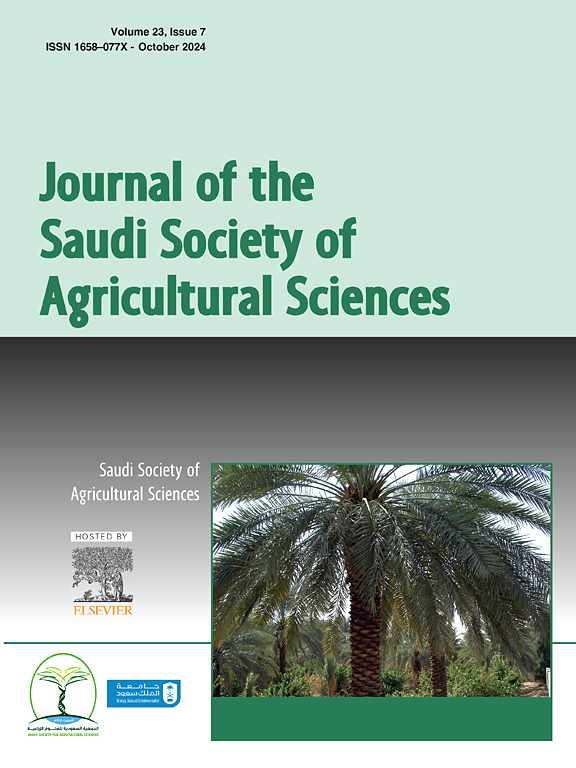Enhancing yield, mineral composition, and energy fractions through intercropping and nutrient management in oats and berseem
Q1 Agricultural and Biological Sciences
Journal of the Saudi Society of Agricultural Sciences
Pub Date : 2024-10-01
DOI:10.1016/j.jssas.2024.06.001
引用次数: 0
Abstract
Inadequate green fodder of subpar quality poses a significant risk to livestock productivity, underscoring the pivotal role of intercropping and integrated nutrient management to effectively address the dual challenge of meeting both quantity and quality requirements in fodder. In this study, employing factorial randomized block design the experiment incorporated intercropping treatments S1- sole oats, S2- sole berseem, S3- 2 rows of oats + 1 row of berseem, and S4 −1 row of oats + 2 rows of berseem) alongside four nutrient management treatments N1- Control (100 % Recommended dose of fertilizer (RDF)), N2 − 50 % RDF + Plant growth promoting rhizobacteria (PGPR) + 2 spray of seaweed extract, N3 − 75 % RDF + PGPR + 2 spray of seaweed extract, N4 − 100 % RDF + PGPR + 2 spray of seaweed extract with each treatment replicated thrice. Results revealed that the significantly highest green fodder yield of oats (24.73 and 12.81 t ha−1) and berseem (13.35 and 13.79 t ha−1) in S1 and S2 crops recorded at both the cuts, respectively followed by intercropping of oats: berseem in 2:1 (S3) and 1:2 (S4) row ratio. Application of 100 % RDF + PGPR + 2 spray of seaweed extract recorded the highest green fodder yield of oats (21.80 and 9.79 t ha−1) and berseem (8.09 and 11.46 t ha−1). Oats and berseem recorded varying trends in nutrient concentration (1.72–18.9 %), nutrient uptake (35.5 kg ha−1 to 251.4 kg ha−1), energy fractions (0.33 MJ kg−1 to 10.2 MJ kg−1) due to intercropping and nutrient management. Therefore, we recommend adopting a combination of oats: berseem intercropping in a 2:1 row ratio, coupled with the application of 100 % RDF + PGPR + 2 sprays of seaweed extract to optimize yield, improve nutritional quality, and increase energy content. This approach ensures efficient utilization of available resources and can be beneficial for the farming community.
通过间作和养分管理提高燕麦和浆果的产量、矿物质成分和能量分数
质量不合格的青饲料对牲畜的生产率构成重大风险,这突出表明了间作和综合养分管理在有效应对满足饲料数量和质量要求的双重挑战中的关键作用。在这项研究中,试验采用因子随机区组设计,将间作套种处理 S1--单种燕麦、S2--单种贝西姆、S3--2 行燕麦 + 1 行贝西姆、S4--1 行燕麦 + 2 行贝西姆与四种养分管理处理 N1--对照(100 % 的推荐剂量肥料 (RDF))、N2 - 50 % RDF + 植物生长促进根瘤菌 (PGPR) + 2 次海藻提取物喷洒;N3 - 75 % RDF + PGPR + 2 次海藻提取物喷洒;N4 - 100 % RDF + PGPR + 2 次海藻提取物喷洒,每个处理重复三次。结果表明,在 S1 和 S2 作物中,燕麦(24.73 吨/公顷-1 和 12.81 吨/公顷-1)和贝母(13.35 吨/公顷-1 和 13.79 吨/公顷-1)的青饲料产量在两割期都明显最高,其次是燕麦:贝母间作,行比为 2:1(S3)和 1:2(S4)。施用 100 % RDF + PGPR + 2 次海藻提取物可获得最高的燕麦青饲料产量(21.80 吨/公顷和 9.79 吨/公顷)和芝麻(8.09 吨/公顷和 11.46 吨/公顷)。由于间作和养分管理的不同,燕麦和青贮玉米的养分浓度(1.72-18.9%)、养分吸收量(35.5 千克/公顷-1 至 251.4 千克/公顷-1)、能量分数(0.33 兆焦耳/千克-1 至 10.2 兆焦耳/千克-1)都呈现出不同的趋势。因此,我们建议以 2:1 的行比结合燕麦和贝西姆间作,同时施用 100 % RDF + PGPR + 2 次海藻提取物喷雾,以优化产量、改善营养质量并提高能量含量。这种方法可确保有效利用现有资源,并为农业社区带来益处。
本文章由计算机程序翻译,如有差异,请以英文原文为准。
求助全文
约1分钟内获得全文
求助全文
来源期刊

Journal of the Saudi Society of Agricultural Sciences
Agricultural and Biological Sciences-Agricultural and Biological Sciences (all)
CiteScore
8.70
自引率
0.00%
发文量
69
审稿时长
17 days
期刊介绍:
Journal of the Saudi Society of Agricultural Sciences is an English language, peer-review scholarly publication which publishes research articles and critical reviews from every area of Agricultural sciences and plant science. Scope of the journal includes, Agricultural Engineering, Plant production, Plant protection, Animal science, Agricultural extension, Agricultural economics, Food science and technology, Soil and water sciences, Irrigation science and technology and environmental science (soil formation, biological classification, mapping and management of soil). Journal of the Saudi Society of Agricultural Sciences publishes 4 issues per year and is the official publication of the King Saud University and Saudi Society of Agricultural Sciences and is published by King Saud University in collaboration with Elsevier and is edited by an international group of eminent researchers.
 求助内容:
求助内容: 应助结果提醒方式:
应助结果提醒方式:


